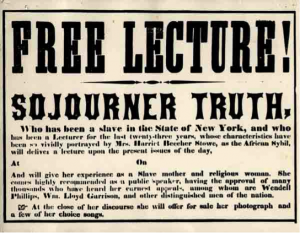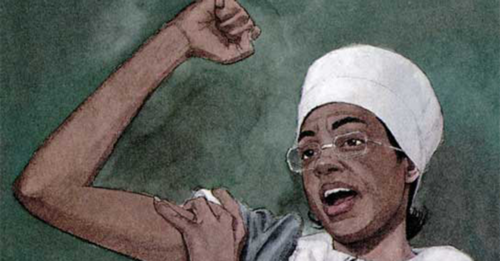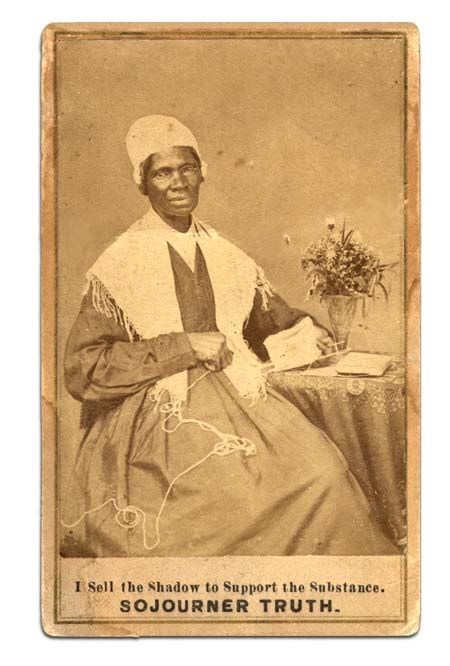 Here is a poster publicizing Sojourner's movements and powerful "lectures".https://www.clarabartonmuseum.org/On January 21st, 2018, women from all around the world marched the streets of Washington D.C. advocating human rights and women’s rights. Sojourner Truth was the first to confront the world about the difference that women and slaves made to society in the 1800s. She was the genesis of anti-slavery and the women’s rights movement. Truth was an abolitionist and women’s rights activist. She used to be a slave but once she was released, her goal was to inform people about her experience as an African-American woman slave. Truth is most known for her speech at the Seneca Falls Convention, fighting for women’s rights. The peak of her life was in the span of about 37 years, continuously striving to influence others with the idea that she believed was just and she took action for what she believed in since the beginning. Heroes must possess truthfulness and consideration for other people. Truth’s actions helped many people overcome differences and made the world more unified. Sojourner Truth possesses the authenticity and diligence that someone would need to be a hero.
Here is a poster publicizing Sojourner's movements and powerful "lectures".https://www.clarabartonmuseum.org/On January 21st, 2018, women from all around the world marched the streets of Washington D.C. advocating human rights and women’s rights. Sojourner Truth was the first to confront the world about the difference that women and slaves made to society in the 1800s. She was the genesis of anti-slavery and the women’s rights movement. Truth was an abolitionist and women’s rights activist. She used to be a slave but once she was released, her goal was to inform people about her experience as an African-American woman slave. Truth is most known for her speech at the Seneca Falls Convention, fighting for women’s rights. The peak of her life was in the span of about 37 years, continuously striving to influence others with the idea that she believed was just and she took action for what she believed in since the beginning. Heroes must possess truthfulness and consideration for other people. Truth’s actions helped many people overcome differences and made the world more unified. Sojourner Truth possesses the authenticity and diligence that someone would need to be a hero.
Sojourner Truth’s harsh experiences in slavery reinforce the amelioration she undertook, through the authenticity of her words and emotions. Born Isabella Baumfree, Truth had a difficult life straight from adolescence into adulthood. “One visit occurred when she was around thirteen, a time when Isabella felt especially burdened by abusive slavers, the Nealys, who repeatedly whipped her for speaking only Dutch,”(Moore). She was abused at a young age for being herself. An African American girl. Not only was she made fun of, but she also was arranged to have kids with a husband she barely knew. This corroborates that Truth’s life was filled with inhumane and discriminative situations which gave her the ability to make her speeches powerful and convincing. What helped Sojourner emotionally survive was her faith. “My name was Isabella; but when I left the house of bondage, I left everything behind. . . . I went to the Lord and asked him to give me a new name. And the Lord gave me Sojourner, because I was to travel up and down the land, showing the people their sins, and being a sign unto them,” (DISCovering Biography). This quote is so inspiring because her optimism was the start of her journey of being Sojourner Truth. Truth believed that she could make use of all the negativity she’s gone through, and turn it to something amazing for the world. Truth had a reason for everything she did and she made sure that everyone was aware that these types of bad things truly happen.
 Here is a piece of artwork showing Truth during a speech.rmnetwork.orgIt never was enough. Sojourner had diligence and continued on throughout her whole life fighting against what was wrong with society. Using her drive from religion, she was able to empower her words and confidence. “At Northampton, Sojourner began to express her religious piety in a decidedly social manner, as she began to speak more forcefully against slavery and to advocate women’s suffrage,” (Moore). In 1844, Truth began to give speeches even though it was a tad bit difficult to understand her. But this of course encouraged her even more to acknowledge the lack of equality around that time. Her overall goal was to inspire and persuade people to make a change in the world so that little girls and boys wouldn’t have to grow up in a world where all of this intolerant behavior was considered “normal.” Amid the Civil War, Truth bought endowments for the soldiers with cash raised from her speeches and helped runaway slaves find work and housing. “After the war she continued her tirade for the Lord and against racial injustice, even when old age and ill health restricted her activities to the confines of a Battle Creek, Michigan, sanatorium. She died there on November 26, 1883,” (World of Sociology). From the day she was emancipated till her death, Sojourner believed her mission would prevail, therefore she was committed and unstoppable. She also cared about things other than the abolition of slavery and women’s rights. No matter what contradictors said, Sojourner was a hero for everyone she stood up for because her diligence assured everyone that it was all going to be okay.
Here is a piece of artwork showing Truth during a speech.rmnetwork.orgIt never was enough. Sojourner had diligence and continued on throughout her whole life fighting against what was wrong with society. Using her drive from religion, she was able to empower her words and confidence. “At Northampton, Sojourner began to express her religious piety in a decidedly social manner, as she began to speak more forcefully against slavery and to advocate women’s suffrage,” (Moore). In 1844, Truth began to give speeches even though it was a tad bit difficult to understand her. But this of course encouraged her even more to acknowledge the lack of equality around that time. Her overall goal was to inspire and persuade people to make a change in the world so that little girls and boys wouldn’t have to grow up in a world where all of this intolerant behavior was considered “normal.” Amid the Civil War, Truth bought endowments for the soldiers with cash raised from her speeches and helped runaway slaves find work and housing. “After the war she continued her tirade for the Lord and against racial injustice, even when old age and ill health restricted her activities to the confines of a Battle Creek, Michigan, sanatorium. She died there on November 26, 1883,” (World of Sociology). From the day she was emancipated till her death, Sojourner believed her mission would prevail, therefore she was committed and unstoppable. She also cared about things other than the abolition of slavery and women’s rights. No matter what contradictors said, Sojourner was a hero for everyone she stood up for because her diligence assured everyone that it was all going to be okay.
 Above is a portrait of Sojourner with a quote that must be thoroughly thought about to find the deeper meaning hidden within.https://www.sojournertruth.org/Sojourner Truth has the realness and persistence that a luminary obtains. She grew up being held back from her abilities and once she was emancipated, she was set and stone for her plan to try to make life better for everyone. She proved to the men, who were being uncivil, that women do matter to society and that she survived on her own without having a man make decisions for her. There was never a time where Sojourner felt like giving up. Sojourner did nothing but stand up for all the women and slaves who were too afraid to let out their feelings from the bad times they were experiencing. The quote, “I sell the Shadow to Support the Substance,” infers how she shows who she is, but also wants to be known as the person who is behind all her big actions. Truth is proud of who she is and uses her past experiences to support why she’s doing what she’s doing. Truth influenced many movements and people’s perception of society with her inevitable charisma towards equal rights. Today in the twenty-first century, people think they’ve gotten better at treating people equally. Prejudice takes over societies brains but if thought deeply enough, it is obvious that society bias takes place in some way shape or form. The world needs more “Sojourner Truths” to eventually make a greater impact on what the general population barely touches on.
Above is a portrait of Sojourner with a quote that must be thoroughly thought about to find the deeper meaning hidden within.https://www.sojournertruth.org/Sojourner Truth has the realness and persistence that a luminary obtains. She grew up being held back from her abilities and once she was emancipated, she was set and stone for her plan to try to make life better for everyone. She proved to the men, who were being uncivil, that women do matter to society and that she survived on her own without having a man make decisions for her. There was never a time where Sojourner felt like giving up. Sojourner did nothing but stand up for all the women and slaves who were too afraid to let out their feelings from the bad times they were experiencing. The quote, “I sell the Shadow to Support the Substance,” infers how she shows who she is, but also wants to be known as the person who is behind all her big actions. Truth is proud of who she is and uses her past experiences to support why she’s doing what she’s doing. Truth influenced many movements and people’s perception of society with her inevitable charisma towards equal rights. Today in the twenty-first century, people think they’ve gotten better at treating people equally. Prejudice takes over societies brains but if thought deeply enough, it is obvious that society bias takes place in some way shape or form. The world needs more “Sojourner Truths” to eventually make a greater impact on what the general population barely touches on.
Works Cited
"Sojourner Truth." DISCovering Biography, Gale, 2003. Research in Context, https://link.galegroup.com/apps/doc/EJ2102101853/MSIC?u=powa9245&sid=MSIC&xid=8e739bfb. Accessed 3 Feb. 2018.
"Sojourner Truth." World of Sociology, Gale, 2001. Biography in Context, https://link.galegroup.com/apps/doc/K2427100177/BIC1?u=powa9245&xid=077eb70a. Accessed 2 Feb. 2018.
"Truth, Sojourner." Encyclopedia of Race and Racism, edited by John Hartwell Moore, vol. 3, Macmillan Reference USA, 2008, pp. 168-169. Gale Virtual Reference Library, https://link.galegroup.com/apps/doc/CX2831200381/GVRL?u=powa9245&sid=GVRL&xid=e9556c91. Accessed 2 Feb. 2018.
Page created on 2/14/2018 4:29:44 PM
Last edited 8/25/2018 6:55:05 PM
